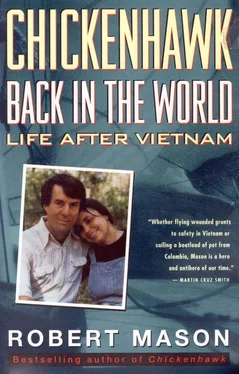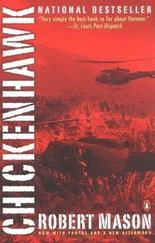Robert Mason - Chickenhawk - Back in the World - Life After Vietnam
Здесь есть возможность читать онлайн «Robert Mason - Chickenhawk - Back in the World - Life After Vietnam» весь текст электронной книги совершенно бесплатно (целиком полную версию без сокращений). В некоторых случаях можно слушать аудио, скачать через торрент в формате fb2 и присутствует краткое содержание. Год выпуска: 2013, Издательство: BookBaby, Жанр: Старинная литература, на английском языке. Описание произведения, (предисловие) а так же отзывы посетителей доступны на портале библиотеки ЛибКат.
- Название:Chickenhawk: Back in the World - Life After Vietnam
- Автор:
- Издательство:BookBaby
- Жанр:
- Год:2013
- ISBN:нет данных
- Рейтинг книги:3 / 5. Голосов: 1
-
Избранное:Добавить в избранное
- Отзывы:
-
Ваша оценка:
- 60
- 1
- 2
- 3
- 4
- 5
Chickenhawk: Back in the World - Life After Vietnam: краткое содержание, описание и аннотация
Предлагаем к чтению аннотацию, описание, краткое содержание или предисловие (зависит от того, что написал сам автор книги «Chickenhawk: Back in the World - Life After Vietnam»). Если вы не нашли необходимую информацию о книге — напишите в комментариях, мы постараемся отыскать её.
Chickenhawk: Back in the World - Life After Vietnam — читать онлайн бесплатно полную книгу (весь текст) целиком
Ниже представлен текст книги, разбитый по страницам. Система сохранения места последней прочитанной страницы, позволяет с удобством читать онлайн бесплатно книгу «Chickenhawk: Back in the World - Life After Vietnam», без необходимости каждый раз заново искать на чём Вы остановились. Поставьте закладку, и сможете в любой момент перейти на страницу, на которой закончили чтение.
Интервал:
Закладка:
An IP radioed while crashing. In the few seconds he had left on the planet he said that if you push the cyclic stick forward in autorotation, the Hughes’s nose tucked down and the controls didn’t work—
A few weeks later, a test pilot at the Hughes factory in Culver City, California, took a Hughes up very high and tried duplicating the condition. The dead guy was right. The Hughes tucked and stayed there, straining like a dowsing rod to reach the ground. The Hughes test pilot (wearing a parachute) tried using the opposite control—pushed the cyclic forward. Worked. The Hughes came out of the dive, taking fifteen hundred feet to recover. They sent the word back to us: don’t let your students push the cyclic forward in autorotation, and demonstrate the recovery to all Hughes instructors. Hoots in our Hiller flight room. Autorotations were done at five hundred feet, Pete. See it now: Peter Pilot pulls out of dive a thousand feet underground. Comical stuff.
My flight commander told me I had been selected to cross-train into the Hughes. I will fly a regular student load and learn Hughes in my off time. An honor, he said; he respected my flying skill.
Methods of Instruction again. Lineberry was gone. To Vietnam. A warrant officer pro-instructor took me out and tried to impress on me how nifty this little piece-of-shit helicopter was. Showed me the seven rubber belts that connected the engine to the transmission; claimed the system could operate even when only two belts were left. I nodded. We flew. Hughes buzzed a lot, but it was very maneuverable. I had trouble with the pedals. The tail rotor was too small and it was hard to move the tail around in strong wind. There was very little inertia in the lightweight main rotors, which made autorotations snappier, less forgiving of small errors than the Hiller. Pro-instructor climbed to three thousand feet and said, “You’re supposed to see this.” He cut the power and nudged the cyclic forward. Whap! Little shit dumped over on its nose. My goofy, friendly Hiller would never do that. (You can stop a Hiller on its tail during autorotation, slide backward, and then dump the nose down, accelerate, and get to where you’re going—something you might have to do if you’re already on top of the best spot to land, which you cannot do in a Hughes.) “Recovery is simple,” pro-instructor said as we hurtled out of sky. “Just give the cyclic forward pressure, wait until the nose starts to come back up, and then resume normal control.” He did that and the Hughes came out of kamikaze landing approach. Fun, but academic.
“Autorotations are always done from five hundred feet,” I said.
Pro-instructor shrugged. “You won’t be able to recover from five hundred feet, but this demonstration will make it hard to forget to keep your student from pushing the cyclic forward.” Good point. Still haven’t forgotten.
Two weeks later, when I finished the cross-training, my flight commander called me in again. They needed a substitute instructor in a Hughes flight—just one day. Just one day with that flight. But there was always a flight that needed a substitute. I now had a double load of work. I thought of the flight commander as an asshole.
I was having trouble at home. I drank more every night to get to sleep. I slept, but woke up exhausted. Argued with Patience—always cooked the same meals; sometimes forgot to cook at all; she wasn’t sticking to our budget. Jack wanted to play.
Jack was learning to count. Sometimes I paid attention to his interests, but mostly not. He and I had a counting game. I held up my index finger and said, “One.” Then I held up two fingers, “Two.” And so on, until I popped up my thumb and said, “Five.” He said he understood. We practiced: one, two, three, four, five. He said the right number when I added a finger. He understood. Quick-witted little guy. I held up my fist and raised my thumb. “Five,” Jack said. Ah. Each finger was a number to Jack. We would have to work on this.
But I didn’t. At least not very often. I didn’t play with Jack enough, I didn’t talk to Patience enough. I was drifting around in a fog of internalizations, talking to myself, fighting demons that kept coming back. Things just popped into my mind that I didn’t want to see. I’m sitting alone in the living room at two a.m. I see twenty-one men trussed in a row, ropes at their ankles, hands bound under their backs—North Vietnamese prisoners. A sergeant, his face twisted with anger, stands at the first prisoner’s feet. The North Vietnamese prisoner stares back, unblinking. The sergeant points a .45 at the man. He kicks the prisoner’s feet suddenly. The shock of the impact jostles the prisoner inches across the ground. The sergeant fires the .45 into the prisoner’s face. The prisoner’s head bounces off the ground like a ball slapped from above, then flops back into the gore that was his brains. The sergeant turns to the next prisoner in the line.
“He tried to get away,” says a voice at my side.
“He can’t get away; he’s tied!”
“He moved. He was trying to get away.”
The next prisoner says a few hurried words in Vietnamese as the sergeant stands over him. When the sergeant kicks his feet, the prisoner closes his eyes. A bullet shakes his head.
“It’s murder!” I hiss to the man at my side.
“They cut off Sergeant Rocci’s cock and stuck it in his mouth. And the same with five of his men,” the voice says. “After they spent the night slowly shoving knives into their guts. If you had been here to hear the screams—they screamed all night. This morning they were all dead, all gagged with their cocks. This isn’t murder; it’s justice.”
Another head bounces off the ground. The shock wave hits my body.
“They sent us to pick up twenty-one prisoners,” I plead.
“You’ll get ‘em. They’ll just be dead, is all.”
The sergeant moves down the line, stopping prisoners who try to escape. The line of men grows longer than it had been, and the sergeant grows distant. His face glows red and the heads bounce. And then he looks up at me. I jump out of the chair and get a drink.
I decided we should take a weekend trip to New Orleans with friends, Ray Welch and his wife. I felt excited about the trip, thought it would be the break I needed—it would distract me from my memories. Hadn’t been away from the post except to go to my sister’s wedding in Florida one weekend without Patience. My sister, Susan, asked me to wear my dress blues with medals. For Susan, I put on the bellhop uniform and medals. Drunk asked me, where was my flag? Loud. People all looked at the geek Army guy—one of the guys losing the war. I walked away. Now, though, I’ll be with Patience and my friend, Ray; and we won’t wear Army stuff.
Missed the plane to New Orleans Friday night. Spent the night in a cheap Fort Worth hotel, laughing and drinking. Caught a plane the next morning, checked into a medium-priced (dumpy) hotel. The fun of the previous night wore thin. Wondered what I was doing in New Orleans. See the sights, Patience said. We got a cab, told the driver to take us to the sights.
Got out at an old park. Feeling bad. Held my breath because I didn’t want Ray to see me breathe into a paper bag—too embarrassing. We walked to an ancient graveyard; I dropped back from the others, feeling faint. Squatted, head between knees, on the sidewalk. Patience comforted me. I stood up and walked inside the cemetery. Sank to my knees on the grass, inside cool walls, beside quiet vaults.
Made it to a sidewalk cafe as if it were a desperate mission. Sucked down whiskey, shaking. Four whiskies later, not shaking. Back to normal, telling funny stories. “Man,” I said, “Don’t know what that was all about, but I’m feeling fine now.” I smiled. Ray and his wife looked relieved.
Читать дальшеИнтервал:
Закладка:
Похожие книги на «Chickenhawk: Back in the World - Life After Vietnam»
Представляем Вашему вниманию похожие книги на «Chickenhawk: Back in the World - Life After Vietnam» списком для выбора. Мы отобрали схожую по названию и смыслу литературу в надежде предоставить читателям больше вариантов отыскать новые, интересные, ещё непрочитанные произведения.
Обсуждение, отзывы о книге «Chickenhawk: Back in the World - Life After Vietnam» и просто собственные мнения читателей. Оставьте ваши комментарии, напишите, что Вы думаете о произведении, его смысле или главных героях. Укажите что конкретно понравилось, а что нет, и почему Вы так считаете.












